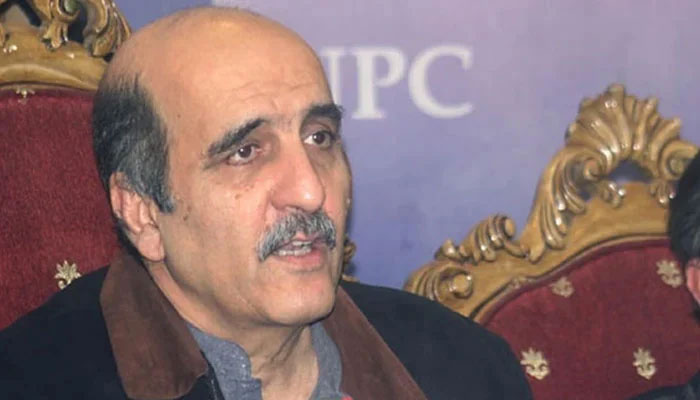Akbar S Babar slams PTI leadership, calls for ‘credible’ intra-party polls
Babar expresses regret that Adiala Jail was being used as an unofficial PTI headquarters, in violation of both law and jail regulations
ISLAMABAD: Pakistan Tehreek-e-Insaf founding member Akbar S. Babar criticised the party on Wednesday for fostering “anarchy and chaos” in the country, alleging that Adiala Jail has become a de facto camp office for Imran Khan
Speaking to the media outside the Election Commission Secretariat, Babar, who was a close confidante of PTI leader Imran Khan for years, expressed regret that Adiala Jail was being used as an unofficial PTI headquarters, in violation of both the law and jail regulations.
“The jail, where Imran is currently incarcerated, is being used to issue protest calls designed to spread chaos across the country. It is the government’s responsibility to uphold the rule of law, including enforcing jail regulations. If any court order impedes this, it should be challenged in a higher court,” Babar asserted.
He suggested that a law or ordinance be enacted to ban all protests in Islamabad Capital Territory (ICT) during visits from foreign dignitaries or high-profile international conferences, such as the SCO summit currently being held.
Babar also highlighted that a national conference of PTI founding members and former office bearers was held in Islamabad on January 25, 2024. The event, presided over by Saeedullah Khan Niazi—PTI founding member, founding president of Punjab, and Imran Khan’s first cousin—declared that the current PTI leadership had lost its legal, political, and moral right to lead the party, rejecting their plans for fresh intra-party elections. Babar stressed that no one could impose a party chairman unless lawfully elected by PTI members. He criticised the state of democracy, claiming that individual and family-driven political parties were merely using their platforms to gain power, rather than fostering credible leadership capable of addressing the nation’s challenges.
The PTI’s failure to hold credible intra-party elections, Babar claimed, has led to a constitutional crisis, with the Parliament, election commission, and Supreme Court now at odds.
To resolve the crisis, Babar offered three potential solutions: either the ECP authorises PTI founding members to hold intra-party elections under the law, or a mediation process is initiated, similar to the Supreme Court’s involvement with the ECP and presidency in agreeing on an election date for February 8. “A mediation process could involve the PTI founding chairman appointing a lawyer of his choice to negotiate with the party’s founding members on terms of reference for transparent intra-party elections. If these two options fail, the ECP must enforce the law to its full extent, regardless of the consequences,” Babar added.
He argued that credible intra-party elections are the democratic solution to Pakistan’s leadership crisis. Citing the example of Britain, the birthplace of parliamentary democracy, he said that over a dozen sitting prime ministers, including Margaret Thatcher, were replaced through intra-party elections—even after leading their parties to landslide victories.
Babar clarified that he and other founding members do not seek positions within the PTI, but simply want the party to return to its founding ideals and rid itself of those who have illegally taken control.
-
 Savannah Guthrie Sends Desperate Plea To Mom Nancy Kidnapper
Savannah Guthrie Sends Desperate Plea To Mom Nancy Kidnapper -
 NBA All-Star 2026 Shake-up: Inside The New USA Vs World Tournament Format
NBA All-Star 2026 Shake-up: Inside The New USA Vs World Tournament Format -
 Warner Bros Consider Reopening Deal Talks With Paramount, Says Reports
Warner Bros Consider Reopening Deal Talks With Paramount, Says Reports -
 Andrew Mountbatten Windsor Faces Future With UK MPs, Says Expert
Andrew Mountbatten Windsor Faces Future With UK MPs, Says Expert -
 Shamed Andrew Told 'nobody Is Above The Law' Amid Harrowing Silence
Shamed Andrew Told 'nobody Is Above The Law' Amid Harrowing Silence -
 Gisele Bundchen Melts Hearts With Sweet Bike Ride Glimpse Featuring Son
Gisele Bundchen Melts Hearts With Sweet Bike Ride Glimpse Featuring Son -
 Prince William Found Meghan Markle ‘quite Refreshing’ At Start
Prince William Found Meghan Markle ‘quite Refreshing’ At Start -
 Kate Middleton Knew Should Could Not Be ‘voice Of Reason’ With Prince Harry
Kate Middleton Knew Should Could Not Be ‘voice Of Reason’ With Prince Harry -
 Rihanna Has Wardrobe Malfunction At A$AP Rocky Fashion Show
Rihanna Has Wardrobe Malfunction At A$AP Rocky Fashion Show -
 Prince Harry Felt System Had ‘one Rule For Him, One For Prince William’
Prince Harry Felt System Had ‘one Rule For Him, One For Prince William’ -
 Jake Paul's Fiancée Sends Him Over The Moon Over Stunning Victory
Jake Paul's Fiancée Sends Him Over The Moon Over Stunning Victory -
 Harper Beckham Sends Valentine’s Love Amid Brooklyn Family Drama
Harper Beckham Sends Valentine’s Love Amid Brooklyn Family Drama -
 Why Prince William, Kate Middleton 'partnership' Is Important For Monarchy
Why Prince William, Kate Middleton 'partnership' Is Important For Monarchy -
 Katie Price Drama Escalates As Family Stays In Touch With Ex JJ Slater
Katie Price Drama Escalates As Family Stays In Touch With Ex JJ Slater -
 Critics Target Palace Narrative After Andrew's Controversy Refuses To Die
Critics Target Palace Narrative After Andrew's Controversy Refuses To Die -
 Sarah Ferguson’s Delusions Take A Turn For The Worse: ‘She’s Been Deserted’
Sarah Ferguson’s Delusions Take A Turn For The Worse: ‘She’s Been Deserted’




